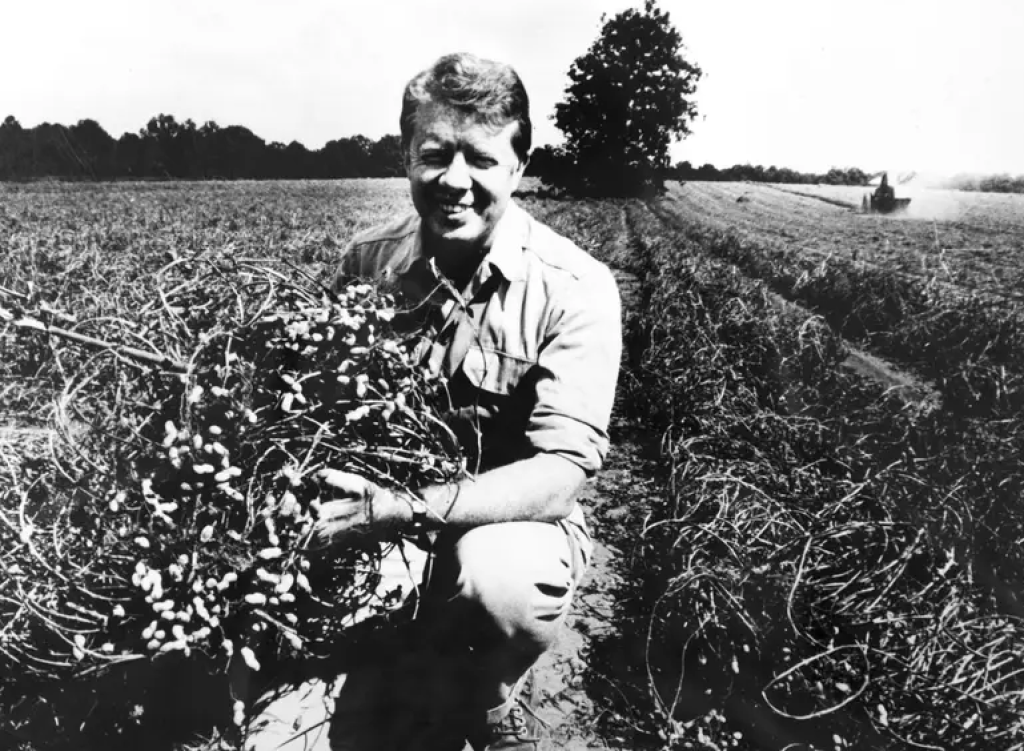On December 29, 2024, the world lost one of its most distinguished figures—James Earl Carter Jr., the 39th President of the United States, former Navy officer, dedicated humanitarian, and yes, the world’s most famous peanut farmer. Jimmy Carter, who passed away at the remarkable age of 100, leaves behind a legacy that spans far beyond politics. His life was defined by service, humility, and an unwavering commitment to bettering the world in all his endeavors.
Early Life and the Peanut Farm
Born on October 1, 1924, in Plains, Georgia, Jimmy Carter grew up in a small town that would forever shape his worldview. Carter’s early years on the farm would leave an indelible mark on his character, and those lessons would stay with him throughout his life. 
Carter’s journey into farming was not without challenges. The young man, always inquisitive and hands-on, took over the family peanut farm after his father’s death in the mid-1950s. Through his diligence and vision, he transformed the farm, improving productivity and introducing innovative techniques that garnered both local and regional attention. His ability to blend agriculture with entrepreneurial spirit earned him a reputation in the farming community, and he eventually opened a peanut warehouse business, further solidifying his deep ties to the agricultural industry.
But Carter’s approach to farming was never just about business. He had a profound respect for the land and a belief in ethical stewardship. It was during these formative years that he learned the value of honest work, compassion, and the interconnectedness of communities—values he carried into his political career and later into his post-presidency humanitarian efforts.
Politics: A Mission of Service
Jimmy Carter’s political career began in Georgia’s state senate, but it was his election to the presidency in 1976 that brought him to global prominence. Carter’s presidency was marked by a commitment to human rights, environmental sustainability, and peace. His famous Camp David Accords brokered peace between Egypt and Israel, a landmark achievement that earned him the Nobel Peace Prize in 2002. His time in office was not without controversy, particularly during the Iran hostage crisis and economic challenges, but his legacy as a moral leader and a champion of diplomacy remains undeniable.
Yet, even as President, Carter never lost touch with his roots. His down-to-earth nature, often compared to the aristocratic distance of many of his contemporaries, made him relatable to ordinary Americans. His southern accent and modest demeanor spoke to a man who was grounded in the principles of his upbringing.
Retirement: A Lifelong Commitment to Humanity
Carter’s post-presidency years were perhaps the most defining phase of his life. After leaving the White House in 1981, he turned his focus to humanitarian work, working tirelessly for peace, social justice, and the eradication of diseases such as Guinea worm disease. Through the Carter Center, founded in 1982, Carter worked to advance democracy, alleviate suffering, and promote global health. His efforts in conflict resolution, election monitoring, and disease eradication have had a profound impact on millions of people around the world.
Perhaps most emblematic of Carter’s character in his later years was his work with Habitat for Humanity, the global nonprofit organization dedicated to building homes for those in need. Jimmy and his wife, Rosalynn, dedicated significant time and effort to helping build homes for families, using their fame not for personal gain, but to lift up those less fortunate.
Carter’s humility and willingness to roll up his sleeves alongside volunteers made him beloved by many. While other former presidents lived in luxury, Carter chose to live a life of simplicity. He and Rosalynn remained in their modest home in Plains, Georgia, where he could be close to the people and the land that had shaped him.
A Century of Service
At the age of 100, Jimmy Carter had achieved more than most could in multiple lifetimes. His life was a study in perseverance, kindness, and service to others. Whether through his peanut farm, his presidency, or his post-presidential humanitarian work, Carter’s life exemplified the idea that greatness is not defined by titles or wealth, but by the impact one has on the world and the people around them.
Jimmy Carter’s passing marks the end of a century-long journey, but his legacy will live on. He demonstrated that leadership is not just about making decisions in the halls of power, but about living out one’s principles through action and empathy. As a peanut farmer, a president, a peace-builder, and a global humanitarian, Carter will be remembered not for his titles or accolades, but for the quiet, steadfast way he gave of himself to others.
In his own words, Jimmy Carter once said, “We should live our lives as though Christ were coming this afternoon.” A life well lived, indeed.
Treat yourself to a few cans of Hancock Peanuts in honor of President Carter.
Follow us on social here: Instagram | Facebook | Twitter | Threads | LinkedIn | TikTok
